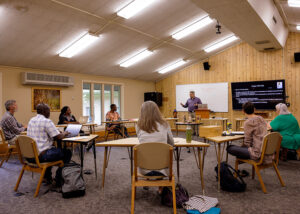After nine years of working together on the Being a Faithful Church (BFC) process, by an 85 percent majority, delegates at Assenbly 2016 in Saskatoon approved the BFC7 recommendation. (See “Delegates vote to allow space for differences.”)
In essence, the recommendation had four parts: to continue to hold the Confession of Faith in a Mennonite Perspective as a unifying document within our body; to respectfully acknowledge that through careful study of Scripture and prayer, some have been led to a different understanding on committed same-sex relationships than is commonly understood within the Confession of Faith; to create space/leave room within our faith community to test alternative understandings from that of the larger body, to see if they are a nudging of the Holy Spirit; and to develop ways we can continue listening and engaging one another as we move forward.
For some within our community of faith, this recommendation simply goes too far. As I have heard expressed, such a recommendation opens up the possibility of condoning sin. For others, the resolution doesn’t go far enough and that it is a sin that we, as a national church, exclude LGBTQ members from full participation within our church. Both see the recommendation as simply unacceptable.
So what are we to do? If we come down hard on one side, we cut off ourselves off from those we disagree with. That’s why I believe the wisdom of this recommendation lies in the concept of creating space.
On the surface, this recommendation could be criticized for being “weak” or “compromised.” It reveals our unwillingness to fully side with this way or that. But as we look upon our increasingly polarized world in which violent extremism, both in action and word, seems to win the day, creating space, particularly for those we disagree with, breaks through our polarizations and allows us to find new ways forward based on relationship, rather than ideology.
This way forward is certainly murkier than clear-cut statements, but by creating space we are actually limiting ourselves from the need to control others or to force others to think as we do. To put it another way, consider this: When was the last time someone successfully changed your mind and heart because you were coerced? Violence is not an effective way to bring about desired change. But when we create space, when we limit ourselves and make room for the “other,” not only will it be possible they might change, but, by the grace of God, we might too!
While I am not a fan of the word “nonviolence,” I think it’s silly that we use a negative descriptor to name a positive reality; maybe “creating space” is a better way to go. And what might seem like a small bullet point in a big recommendation, by creating space for one another, and ultimately for the Spirit of God, we are being a faithful church more than we know.
Ryan Siemens is Mennonite Church Saskatchewan’s area church minister of congregational and pastoral relations.






Leave a Reply
You must be logged in to post a comment.